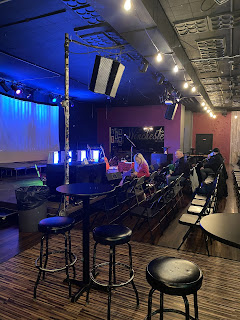I went to a really intimate concert Friday night, to hear a singer/songwriter I've been following for 15+ years. It was supposed to be me and my wife, but... broken ankle. I'd put out a call on Facebook for someone to go with me, and finally a friend who lives 2 hours away stepped up, even though he'd never heard of the performer.
Being super fans, we'd bought special VIP tickets that got us in for a meet-and-greet plus mini-concert and Q&A. One of the songs that was requested during the VIP session was an older song, and during the Q&A he commented that the song he'd just played was one of the few of his earlier songs that he still performs, because he's in such a different place than he was 20+ years ago. Songs with lyrics like "you bring the cup and I'll bring the moonshine" just don't resonate for a mid-40s singer with 4 kids. He commented that early in his career, he wanted to be a rock star, to be in front of a big crowd, "HELLO CLEVELAND!!" And now what he wants is for his music to be something that someone in his audience needed to hear, music for the soul. It reminded me sharply of John Keats, the 19th-century poet who left training for a medical career to devote himself to poetry, a decision which he viewed as going from trying to heal the body to writing to heal the soul.
So the concert was not a bunch of hits, not a bunch of feel-good music, it was mostly sad songs, about family dysfunction and struggle, but underlaid by threads of compassion and redemption and hope. And there were lighter moments too, mostly in the banter between songs. But the songs were pretty serious. And the audience was small, by design. There's basically one more row outside the frame, plus several more of the high-top tables with 2-4 seats around them:
Anyway, that's all preamble to probably the most intense minute or so I've ever experienced at a concert.
He's up there singing this song about a dysfunctional family and he just stops and looks at these four guys sitting in the back corner "You guys are f***ing killing me here." And he spends the next 60-90 seconds calling them out for sitting there talking through the show and laughing while he's up there singing serious songs. It was dead silent as he just went off and finally he's like "I don't even know how to recover from this." But he picked up the song more or less where he left off and finished it.
And after the song, a security guy came over to the four guys, presumably to escort them out, and the singer is like "No, you don't need to do that" and he's basically apologizing for calling them out and tells his tour manager to send a round of beers over to them. I tell you what, it felt a lot like where I was in this post on road rage. First, he was absolutely right. These guys were talking through the whole show, and in a small venue with an audience who was mostly hanging on every note and word, they really stood out in a bad way. They weren't ruining the experience for me, but I was aware of them. And he responds with this righteous anger, but there's also something embarrassing about flipping out like that, even when you're basically right. Maybe that's even worse, because you want to apologize but you also know that you weren't wrong, that on some level it's the other party that should be apologizing, but there you are feeling like a dick and not at all comfortable with it.
And at the same time, those dudes needed to be called out. First, for the sake of the rest of the audience who was on the same page with the singer. And in a sense these guys needed to be called out for their own sake, to be told that they were behaving badly, behaving disrespectfully. Considering that they didn't stick around through the next song to get those beers, I'm guessing they didn't learn that lesson, but then again 4 guys can definitely stick together as a group but still have entirely different feelings about what they've just done / experienced. And while being on the receiving end of an angry outburst like this may trigger defensiveness, saying nothing just allows obliviousness to continue.
I don't know. There's no good answer. I've been a performer, and for instance as a high school teacher, your audience is not always the attentive or appreciative, and their behavior can sometimes be pretty lousy. And I know I've felt caught in that dilemma, do you pause to acknowledge and try to correct it or just do your best to go on with the show and ignore it? I think he was right to call them out, but I also understand if he himself was ultimately ambivalent about it. Either way, it was an intensely real moment, that's for sure.


